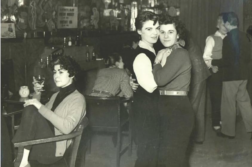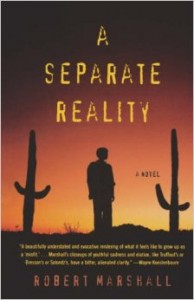 A Separate Reality: A Novel
A Separate Reality: A Novel
by Robert Marshall
Carroll & Graf. 433 pages, $14.95 (paper)
Robert Marshall’s new novel takes us into the mind of twelve-year-old Mark Grosfeld, who lives with his well-off Jewish family in Phoenix and goes to a private school there. Mark is gay, but seems less aware of this fact than his peers at school. He doesn’t think about sex much; his sexual fantasies are not highly developed and are confusing to him. In the novel we live in Mark’s mind during part of 1973 and all of 1974, which is only fitting, as Mark is someone who lives mostly in his own mind. He seeks the meaning of life and change, learns about Taoism, and tries to use it as a guide to life amid parents, siblings, and bullying classmates. Mark is intent on writing poetry as a vehicle to express the new thoughts and connections that keep springing out at him. Sometimes he can’t follow the conversations around him because he’s composing a new poem in his head. He develops a crush on a female teacher who encourages his writing efforts. She marvels at his sensitive writings and likes to write similar stuff, while most others adults have found his ideas and their expression far from clear. The novel takes us through day after day of Mark’s busy though undisciplined intellectual life. By the end of the book, we can sense how long a year seems to an about-to-be teenager. The novel is for adults, though it may well resonate with middle and high school students. Mark emerges as a sensitive and thoughtful child, poised to enter the sexual awareness of young adulthood.
by Ronald Suleski
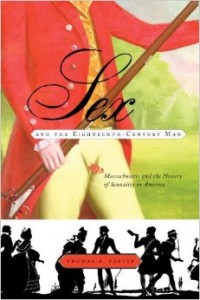 Sex and the Eighteenth-Century Man: Massachusetts
Sex and the Eighteenth-Century Man: Massachusetts
and the History of Sexuality in America
by Thomas A. Foster
Beacon Press. 256 pages, $28.95
This thoroughly researched but slender volume began life as the author’s doctoral dissertation, but Foster’s prose is more readable than many similar books, and for the most part he avoids turgid postmodernese. More than half of his book is devoted to those men who were called fops, sodomites, or effeminates, among other epithets, while the first several chapters focus more on heterosexuality and families. With topics like “Half men” and “Youth, Idleness, and City Sins,” Foster illuminates the discord between Massachusetts’ Puritan founders and those who did not wish to be “normative men.” Some of the theologians who are quoted, notably Cotton Mather, remind us of the origins of today’s religious rhetoric: “Some when they were inflamed at the dance, went from the dancing-school to the brothel house.” Thanks to Massachusetts’ many printing presses and newspapers, and their preservations in libraries and archives, a wide number of publications are available for research; and Foster, who teaches at Chicago’s DePaul University, has consulted primary sources dating back to the 1600’s. It is fascinating to learn that the word effeminacy had a variety of meanings, ranging from sexual immorality to excessive consumption of luxury consumer goods. One of those consumer goods was false calves made of wool, inserted into one’s stockings to fill out the leg, as reported in several 18th century newspapers. Foster also quotes laws and newspaper accounts concerning other men who lived on the margins of Massachusetts society, such as Africans and Native Americans.
by Maurice Gold
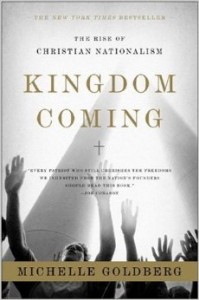 Kingdom Coming: The Rise of Christian Nationalism
Kingdom Coming: The Rise of Christian Nationalism
by Michelle Goldberg
Norton. 224 pages, $23.95
This book is a jolting wake-up call that should rouse even the most complacent U.S. citizen about the erosion of the wall of separation between church and state. In a lucid, journalistic style, Michelle Goldberg, a secular Jew, has performed yeoman’s work in explicating how the dominion theology of the religious right is leading us, not to theocracy, but to theonomy, or government according to biblical law. She chillingly points out that with religious conservatives already in control of two branches of the federal government, only the courts remain out of their grasp—for now. Homosexuality, she argues, is the new abortion, the new wedge issue, and she makes it abundantly clear that Bush would not presently occupy the White House were it not for Karl Rove’s brilliantly orchestrated exploitation of homophobia in all the key states in the 2004 election. Abstinence-only sex education, anti-choice legislation, and FDA restrictions on the availability of the morning-after pill are among the tangible gains they’ve already achieved. Goldberg’s breakdown of the staggering sums funneled to religious organizations thanks to Bush’s faith-based initiatives boggles the mind. Her delightful sense of humor comes through when she refers to “intelligent design” as Creationism dressed up in drag. She even has fun with statistics, for example when enthusing that Massachusetts, the only state with legal same-sex marriage, has the lowest divorce rate in the nation. The final chapter, “Exiles in Jesusland,” reads like a primer on how to combat sectarian extremism, as she underscores the desperate need for a liberal infrastructure on a par with the government-sponsored, media-supported, extremely well-financed network of religious nationalism.
by Ben Edward Akerley
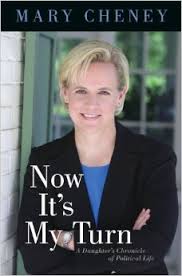 Now It’s My Turn: A Daughter’s
Now It’s My Turn: A Daughter’s
Chronicle of Political Life
by Mary Cheney
Threshold Editions. 256 pages, $25.
Rather than offer a conventional review of Mary Cheney’s book, which came out some months ago amid much hype, was widely reviewed, and fell totally flat in sales, let me pose a few questions, ten in all, that come to mind in retrospect—ten things about which gay America wants to know: 1) How do you feel about the fact that Marley and Me, a book about an adorable dog, made the Times bestseller list for weeks, and you were never even a blip on the radar? Does this mean the religious Right is boycotting you? 2) By bringing out a “tell-all” book during the last two years of the Bush Administration, were you hoping to make a quick killing before plunging back into gay obscurity? 3) Will you go on The View now that Rosie O’Donnell is onboard? 4) A two parter: do you consider yourself a “daddy’s girl”; and have you ever hunted quail together? 5) Did your mother consult you when doing research for her lesbian-inflected pioneer novel Sisters? 6) If you could daydream of one day marrying your significant other, would you be the bride or the groom? Would the bride’s outfit be designed by Vera Wang or Timberland? 7) I hear Pat Robertson is a real hoot on a personal level—has that been your experience? 8) Does your father really refer to the Secretary of State as “Carolina Rice”? 9) You say that John Kerry’s reference to you as a lesbian was “sleazy”: do you really consider that to be a slur? 10) Is it true that your Secret Service codename is Red Carpetmuncher?
by Michael Ehrhardt
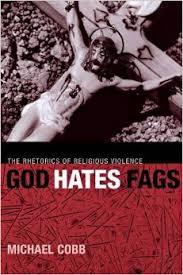 God Hates Fags: The Rhetorics of Religious Violence
God Hates Fags: The Rhetorics of Religious Violence
by Michael Cobb
NYU Press. 208 pages, $65.
In its bid to conquer America, the religious Right has made persistent use of anti-gay rhetoric; this is Michael Cobb’s attempt to understand its effects. Rather than just bemoan its nastiness, Cobb finds that this hateful lambasting has actually launched the cause of gay liberation in positive and useful directions, as this rhetoric has sometimes been re-appropriated as a weapon against the Right’s own attacks. The book’s main title refers to a slogan that Rev. Fred Phelps has smeared onto signs to protest events like Matthew Shepard memorials, but gay groups have found ways to counter-demonstrate in much larger numbers and showcase anti-gay extremism at its worst. Cobb discusses James Baldwin, citing Go Tell It On The Mountain as an early example of the re-appropriation of language to express resistance. He argues that gay activists have used the race analogy to good advantage by defining themselves as a minority in need of protection from discrimination. But it’s the Right that’s always talking about a “gay lifestyle” and a “gay agenda,” thereby affirming the idea of a separate (and hated) minority. Cobb also examines a number of legal and political cases, such as Colorado’s Amendment 2, a referendum that amended the state constitution to prevent any recognition of GLBT people as subject to anti-discrimination laws statewide. In successfully mobilizing the state’s Supreme Court against this amendment, Cobb argues, the gay side took advantage of the way in which it defined gays as a minority only to deny them equal protection under the law. Cobb focuses on that strain of American thought that thrives on creating an insider-outsider mentality. Religious leaders always need a scapegoat on whom to cast their biblical admonishments and punishments. For centuries, African-Americans held this rueful role, but since the Civil Rights movement that onus has shifted to gay people, who have managed so far to deflect this role even as the Right tries to “sacralize” their status as outsiders.
by Andrew Belonsky



